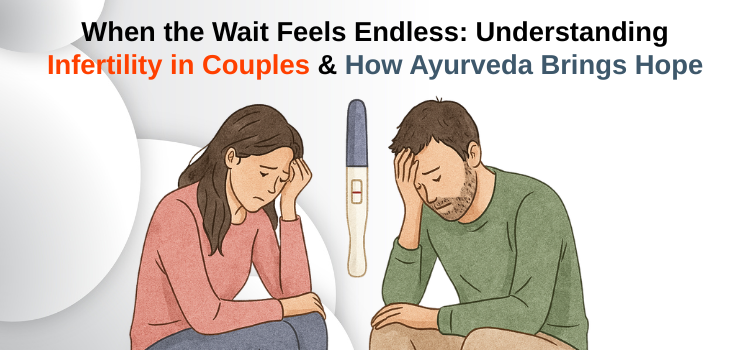Struggling to conceive can feel lonely and hopeless. This heartfelt blog explores male and female infertility, its emotional impact, and how Ayurveda offers natural support through balance, healing, and time-tested herbal care.
It’s been two years of trying.
That’s the line you hear often—sometimes whispered with a shaky voice, other times said with practised calmness to hide the pain.
Infertility isn’t just a medical issue. It’s an emotional journey. It’s the quiet tears after yet another negative test. The awkward family gatherings. The constant stream of advice. The feeling that your body isn’t doing what it was “meant” to do.
And yet, for many couples, infertility is not a dead end. It’s a pause—a call to understand, to nurture, and to heal.
Infertility Affects Both Partners—But Rarely Equally
It’s a common myth that infertility is mainly a female problem. In truth, about 40–50% of infertility cases involve male factors, like low sperm count, poor motility, or abnormal morphology.
Women, on the other hand, may face hormonal imbalances, PCOD, low AMH, endometriosis, or age-related egg quality decline.
Yet in most families, it’s the woman who carries the emotional burden
The Mental Toll: When the Body Struggles, So Does the Mind
There’s no simple way to explain how infertility feels unless you’ve been through it.
For women, every monthly cycle becomes a countdown filled with hope, anxiety, and heartbreak. For men, there’s often silent guilt—especially when reports show abnormal sperm health.
Many couples grow distant, blaming themselves or each other. Intimacy becomes mechanical. Laughter fades.
That’s why healing infertility isn’t just about organs or lab reports. It’s also about rebuilding trust, peace, and connection.
Ayurveda Sees Infertility Differently
In Ayurveda, infertility isn’t defined by just test reports. It is seen as a disturbance in the balance of Agni (digestive fire), Doshas (vata, pitta, kapha), and particularly, the Shukra Dhatu (reproductive tissue).
When there is excess stress, improper lifestyle, disturbed sleep, or poor diet, the body slowly moves away from harmony.
And when that happens, fertility suffers—regardless of gender.
Unlike modern medicine, Ayurveda doesn’t simply target hormones or ovulation.
It works holistically, helping to:
- Improve digestion and nutrient absorption
- Detoxify the body gently
- Rebuild reproductive tissues (Shukra Dhatu)
- Calm the mind and balance emotional energy
- Regulate menstrual cycles and support healthy ovulation in women
- Improve sperm count, quality, and stamina in men
Every Couple’s Journey is Unique, but You Are Not Alone
We’ve met couples who were told “there’s no hope.”
A 36-year-old woman with low AMH conceived naturally after eight months of detox, Rasayan therapy, and gentle cycle tracking.
A man with 90% immotile sperm, who had almost given up, regained healthy motility through lifestyle correction and herbal Rasayanas
Sometimes, all it takes is a shift—from chasing numbers to restoring the whole person.
A Gentle Recommendation, If You’re Looking for Support
If you’re a couple trying to conceive, and you feel like you’ve tried everything, consider looking into natural Ayurvedic support.
Many have found hope in Kulvansh for Male and Kulvansh for Female—a 4-month Ayurvedic course designed to support reproductive health holistically.
What makes it special is not just the herbs, but the ancient Bhavana Vidhi, a traditional process of herb purification and energetic imprinting. It’s crafted to support both husband and wife, as a team, because fertility is not a solo journey.
Closing Thought:
You are not broken. You are not alone.
Infertility may be part of your story—but with the proper guidance, care, and natural healing, it doesn’t have to be the end of it.
